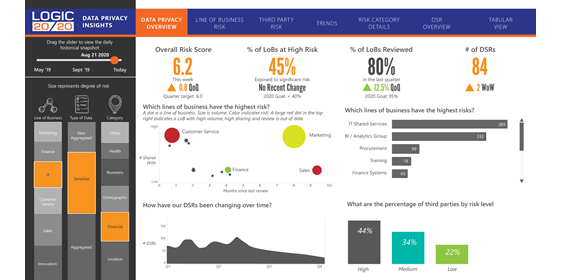Data Privacy as a Service: Ensuring Compliance and Security
Data Privacy as a Service: We maintain your data privacy ecosystems, across teams and functionalities
Being prepared—and staying prepared—for current and future data privacy regulations takes a dedicated team focused on data management, risk assessment and prevention, and process optimization. As expectations around data privacy escalate, more businesses are recognizing the need for stronger consumer privacy protections through solutions like Data Privacy as a Service (DPaaS).
Data privacy is a complex issue, touching multiple parts of the business and requiring the coordinated efforts of different users who think and communicate differently. Different teams may use a whole different language to talk about their requirements and responsibilities in achieving data privacy readiness.
Data Privacy as a Service
We manage Data Privacy as a Service and coordinate efforts across your teams, regardless of how much or how little they typically communicate and collaborate. With our unique team of lawyers, data experts, and strategists, our strength lies in our ability to translate between teams as we help bring your organization into alignment and keep you there for the long term.

We meet you where you are
Every team plays a different role in the data privacy journey and different business or teams are at different stages of maturity. To address increasingly complex data privacy challenges, businesses need to guide their teams effectively in ensuring compliance and strengthening data protection. We work with and across teams in your legal, technology, business, and security departments to leverage existing privacy assets into a unified framework. This framework enables us to oversee your data privacy readiness, from intake to deletion and everything in between.
Our goal is to work as a part of team to improve the function of your data privacy ecosystem through support, optimization, and automation.
What is Data Privacy as a Service?
Data Privacy as a Service is a collection of maintenance, readiness, and ongoing process improvement activities. We take the time to understand your current data privacy ecosystem, establish lines of communication, and provide cross-functional training across teams. It runs a bit like a traditional managed service, but with a dedicated team of data privacy professionals that improve your ecosystem and stay on top new regulations and requirements. DPaaS encompasses a suite of managed services that safeguard the organization’s data and protects data subjects’ rights, ensuring compliance and security.
Maintenance, management & governance
Maintain readiness by ensuring core assets are updated with current processes, data sources or data use cases.
Outcomes: Your team maintains a continuous state of “data readiness” and compliance. We leverage privacy materials already built and enable your core teams to focus on core activities.
Risk assessment & classification
Audit to fully understand how teams, partners, and 3rd party vendors are using customer’s data and the associated potential risks.
Outcomes: Reduced risk of data privacy breach through clear understanding of how data is being used and where it goes.
Optimization
Identify opportunities for automation to scale data privacy processes while maintaining readiness.
Outcomes: Streamlined flows optimize outcomes, increase experience and minimize investments to execute for an improved ROI.
Automation
Maintain readiness by ensuring core assets are updated with current processes, data sources or data use cases.
Outcomes: Outcomes: Identified opportunities to automate data privacy operations to ensure continued readiness with minimal dependence on team members.
Data privacy reporting
We believe in a data-driven approach to managing Data Privacy as a Service. Developing detailed reports for both executives and operational users help you stay on top of quality, accuracy, and speed.

Building a strong foundation for data privacy and compliance
Data protection regulations and compliance
Regulations such as the EU’s General Data Protection Regulation (GDPR) and the California Consumer Privacy Act (CCPA) require organizations to protect personal data with care and precision. Meeting these data protection standards isn’t just about avoiding legal penalties—it’s also essential for safeguarding brand reputation and customer trust.
To ensure compliance, organizations must implement and maintain strong data protection policies and procedures. Regular audits and risk assessments are critical for identifying vulnerabilities, classifying sensitive data—like financial records and personally identifiable information (PII)—and ensuring appropriate safeguards are in place. It’s equally important to verify that partners and third-party vendors follow the same data protection regulations, as lapses outside the organization can create serious risk.
Data collection and management
Strong data protection starts with approaches to how personal data is collected, stored, and managed. Organizations must ensure all data collection and processing activities align with applicable data protection regulations, including full transparency about what is being collected and why.
Comprehensive data management policies are key to maintaining data accuracy, completeness, and relevance. These policies should cover practices such as data classification, data loss prevention, and regular backup and recovery. Effective data management also empowers organizations to respond quickly to data subject requests, minimizing the risk of data breaches and supporting compliance with evolving privacy laws.
Consent management and data subject rights
Consent management is a core element of data privacy, requiring organizations to obtain and document clear, explicit consent before collecting or processing personal data. Robust policies ensure that consent is gathered lawfully and tracked consistently across systems.
Equally critical is honoring data subject rights, including the ability to access, correct, or delete personal information. Meeting these obligations calls for timely, transparent responses supported by well-defined workflows and communication channels. Strong consent management and rights fulfillment not only reduce compliance risk—they also help build trust and strengthen relationships with customers.
Data loss prevention and disaster recovery
Protecting sensitive data from unauthorized access, theft, or loss starts with a strong data loss prevention strategy. Organizations must implement proactive policies and technologies to detect threats early and prevent breaches before they occur.
Equally essential is disaster recovery—ensuring that critical data can be restored quickly in the event of a breach or system failure. Effective disaster recovery requires maintaining regular backups, enforcing encryption, and applying strict access controls. Together, data loss prevention and disaster recovery help safeguard organizational resilience, minimize downtime, and uphold trust with customers and stakeholders.
Privacy solutions and tools
The right privacy solutions and tools are essential for operationalizing data protection regulations and maintaining compliance. These technologies support key functions such as managing consent, honoring data subject rights, and preventing data loss.
Choosing tools that align with the organization’s unique needs is critical to long-term success. Regular audits and risk assessments help ensure these solutions stay effective as regulations and risks evolve. When implemented strategically, privacy platforms and protection tools not only reduce the risk of data breaches—they also help build confidence with clients and regulators alike.
Need help with maintaining data privacy compliance? Let’s work together to answer your questions.
